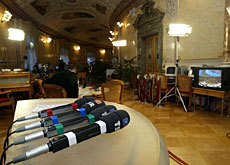Politicians divided over new broadcast law

A new radio and television law is set to change Switzerland’s media landscape – but the measures contained in it are highly controversial.
The bill has divided the four parties in government, with the Social Democrats and Christian Democrats supporting it, while the Radicals and the Swiss People’s Party want it thrown out.
The new law aims to guarantee stronger public service television and radio, and grant more freedom to private broadcasters.
It is intended to reflect changes in the media landscape, such as technological innovations and international developments, and take into account changing viewer habits.
Almost 90 per cent of Swiss are now hooked up to the cable network and have access to almost 50 different television channels. With the advent of digital technology, this could rise to over 100 different stations.
The huge choice of channels has resulted in the country’s multilingual viewers moving away from domestic television towards international broadcasters from France, Germany and Italy.
Tough times
Switzerland’s main domestic broadcaster is the public service Swiss Broadcasting Corporation (SBC), the parent of swissinfo/Swiss Radio International.
The current law makes it hard for private television stations in Switzerland to survive, compared with neighbouring countries, where deregulation took place in the 1980s. Three private broadcasters – Tele 24, TV3, RTL-PRO7 – that offered regional programming have all closed down in the past few years.
Analysts say that Switzerland – with a population of seven million – is too small to sustain numerous channels.
The Federal Communications Office (Ofcom) was instrumental in drawing up the bill. Its vice-director, Martin Dummermuth, says that the new law should change the situation.
“It’s about creating better conditions for private broadcasters,” Dummermuth told swissinfo. He added that in the future, private broadcasters could be granted a share of television licence fees along with the SBC.
Another aim of the law is to ease advertising restrictions for private broadcasters, bringing them into line with European regulations.
Opposition
The first test of the bill will be next Tuesday, when it is due to be discussed by parliament. If thrown out it will go back to cabinet.
It is fiercely opposed by both the rightwing Swiss People’s Party and the centre-right Radicals, although for different reasons.
The Radicals say the new law will curb competition, while the People’s Party maintains that it runs counter to liberal economic policy. The party argues that the legislation will tighten restrictions rather than relaxing them – a move which, it says, will harm the SBC.
The SBC itself has made no secret of the fact that it is less than happy with the law. But the corporation says it doesn’t want to see it scrapped because it believes the basic aims of the law are correct.
“That’s why we want to see amendments made to it as soon as possible, either by the House of Representatives or the Senate,” said SBC director general Armin Walpen.
What disturbs the SBC the most are the plans to cut down on advertising, especially in the domain of sponsoring.
Crumbs
Private companies are also dissatisfied with the new measures and say they are only getting the “crumbs” of the fees cake. They also want more freedom in advertising, saying that the bill’s proposals do not reflect the reality of today’s market.
The Swiss Press Association is against a rejection of the law and, like the SBC, wants amendments made. Those in favour of the present bill include the centre-left Social Democrats, the centre-right Christian Democrats and the Greens.
The bill has taken four years to draw up in consultation with over 200 concerned parties.
But, despite the fact that all parties believe changes are necessary, the future of the law still hangs in the balance.
swissinfo
January 2000: Cabinet adopts a discussion paper on TV law and instructs the environment ministry to revise the law.
End 2000: The environment ministry publishes the draft law and starts the public consultation procedure.
Until April 2001: 200 parties including cantons, political parties and broadcasters take part in consultations.
February 2004: Draft law goes before parliament.

In compliance with the JTI standards
More: SWI swissinfo.ch certified by the Journalism Trust Initiative









You can find an overview of ongoing debates with our journalists here . Please join us!
If you want to start a conversation about a topic raised in this article or want to report factual errors, email us at english@swissinfo.ch.